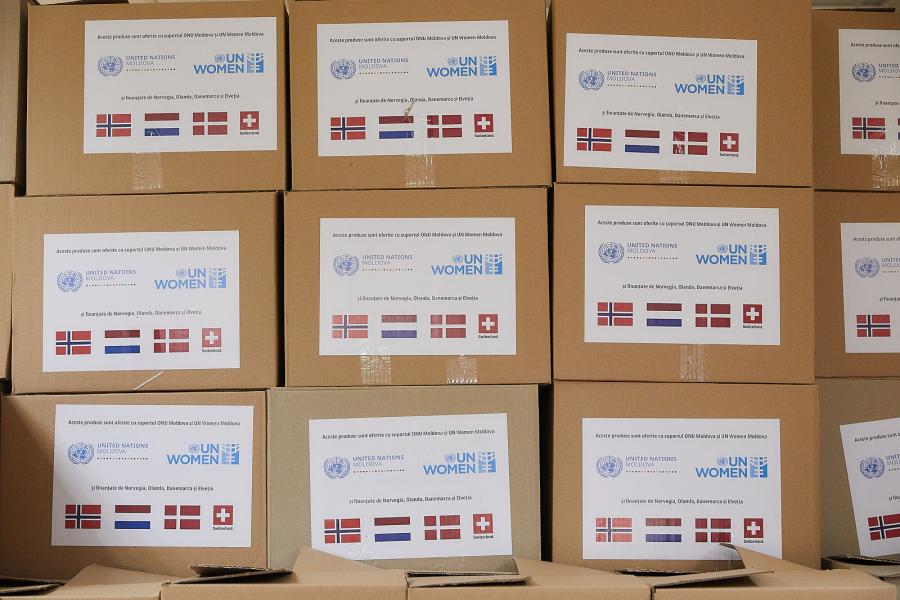Over four thousand vulnerable women from both banks of the Dniester receive food and hygiene packages as a support in response to the COVID-19 pandemic
25 June 2020
Over four thousand women from both banks of the Dniester have benefited from food and hygiene packages thanks to the support offered by UN Women Moldova and funded from the UN COVID-19 Response and Recovery Multi-Partner Trust Fund. The supplies were distributed among others to women affected by domestic violence, women living in shelters, HIV positive women and women with disabilities.

In the gross, over 40 tons of products were delivered to beneficiaries across the country, including to 70 multidisciplinary teams providing social services to people from vulnerable groups.
“COVID – 19 outbreaks continued to have a disproportionate impact on women underpinning the vulnerabilities that are already faced by women from all regions of the country. COVID has specifically affected Women’s livelihoods, income security, access to essential services, and at the same time increasing the burden of care. UN Women has continued to engage and partner with civil society and other actors in providing the much-needed life-saving supplies such as personal protection equipment’s to members of Multi-Disciplinary Teams to enable them reach the most vulnerable women with essential needs such as food packages, hygiene kits, prevention items, among others. This support has targeted victims of violence, HIV-positive and women with disabilities. I would like to commend the financial contributions and partnership with the Governments of Norway, Denmark, Netherlands, and Switzerland through the UN Multi-Partner Trust Fund, that has made this possible”– stated Peterson Magoola, Representative a.i for UN Women Moldova.
The first donations reached Roma women in the town of Hîncești. The beneficiaries stated that the help was very useful, due to the lack of financial resources in this difficult period affecting everyone.
One of the beneficiaries, Valentina Bogdan, tells us: “I am a single mother with two children and I can say that it is very difficult when it comes to food and hygiene supplies. The daughter has a first-degree disability and she is using a wheelchair. Sometimes it happens that I don't even have bread in our house, as the income of 1800 lei per one month is not enough for three people. Even a shampoo and detergents will be very useful to us”. Also, Luminița Matvei, who also benefited from support that includes food and hygiene supplies, tells that: “We don’t work, the money we receive is not enough for us. Until the beginning of the pandemic, everyone was working, but now we don't have this opportunity. Driven by poverty, the children try their luck abroad, nobody is home and it is very difficult. We only have now the money I receive as social assistance, for my disability group”.
Elena Bogdan, community mediator: „We are a total of 450 Roma people. The Roma community in Hîncești is struggling with many problems, first of all – poverty, secondly lack of jobs. There are many people who want to work, but when there is a job available and they see the person is Roma, employers deny that they have vacant positions. We have great difficulties since the pandemic started.The majority of Roma women would have small retail businesses, but during the pandemic they could not sell anything, they weren’t allowed to due to restrictions.
The essential products were delivered in different regions of the country, the objective being supporting women at risk. For example, in Pohrebeni, in the district of Orhei, 48 families were glad to have food on their children’s table and take care of their personal hygiene.
Evghenia Pîslari, beneficiary: ”We have 6 children and it is very difficult to get by. In this pandemic only my husband works. It is difficult also because I can’t work since I have small children and I can’t get a job. We have recently moved into this house and we haven’t paid for it yet.”
Ana Plotnic, beneficiary: ”A lot of things have changed: since our children had to stay at home, I had to clean up more often, cook more food, pay more attention to them. They weren’t in school to get the attention of their teachers, to get helped with school work, so I needed to get more involved, to help them where they couldn’t understand.”
And if some of the women only faced financial difficulties, Alina Nicolaev from Chișinău, also struggled to follow all the hygiene norms and to go shopping during the pandemic, because of her locomotor disability.
Alina Nicolaev, beneficiary: ”I am in this wheelchair for already 9 years. The pandemic hurt us to the core. We are very vulnerable to many illnesses and, unfortunately, we have to pay greater attention to our hygiene, to wear masks, to sanitize our hands. Even if going out... I guess we would need gloves for the wheels as well. In this period I tried to stay calm, so I handcrafted different things. Occasionally, my father would take me to the park and I would sell some of the stuff I make. I like very much socializing with people, talk to them and express my feelings. This is why this period was very difficult for me, because I couldn’t talk to anyone. I miss seeing people so much, hugging and touching them.
This project aims at addressing the immediate needs of vulnerable women during the COVID-19 pandemic and strengthen the national and subnational efforts to sustain these interventions. The project is supported by the Governments of Norway, Denmark, Netherlands and Switzerland and has a total value of one million dollars, of which UN Women Moldova implements a financial support of USD 130,000.
Video on delivering the products to beneficiaries.



